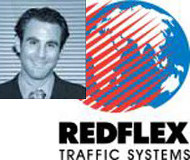Article from: www.thenewspaper.com/news/63/6390.asp
1/31/2018
Redflex Bribery Architect To Have A Hearing On Appeal
Former executive vice president of Redflex Traffic Systems to tell a federal appeals court that he is entitled to a $2.3 million payment.
 The former executive vice president of Redflex Traffic Systems is not backing down on his bid to personally profit from the red light camera bribery scheme he once led. The Seventh Circuit US Court of Appeals will hear Aaron M. Rosenberg make his case in oral arguments next month.
The former executive vice president of Redflex Traffic Systems is not backing down on his bid to personally profit from the red light camera bribery scheme he once led. The Seventh Circuit US Court of Appeals will hear Aaron M. Rosenberg make his case in oral arguments next month.
At issue is the question of whether Rosenberg is a true whistleblower, or just an opportunist. If the former, the ex-red light camera salesman is entitled to $2.3 million in compensation for his assistance in handing over evidence that his former boss approved a multimillion-dollar scheme to pay a Chicago, Illinois transportation official in return for his help in securing the most profitable red light camera contract in the nation. If the appellate judges decide that Rosenberg is just an opportunist, he will be stuck with massive legal bills. Rosenberg's deal with federal prosecutors ensured he would escape jail time.
Count US District Judge John J. Tharp Jr among those who believe Rosenberg is an opportunist. In a stinging rebuke last May, Judge Tharp called Rosenberg a liar seeking to benefit from his crimes (read opinion).
"Rosenberg is anything but the opportunist plaintiff who obtained his knowledge from previous disclosures," the former camera executive's lawyer, John J. Muldoon III, argued in new court filings. "Rosenberg's complaint was based on his own knowledge and information about Redflex based on his many years of working there and having first-hand knowledge of the mechanics of Redflex's scheme."
The legal question is whether Rosenberg provided insight to federal investigators that they could not have otherwise obtained from reading the disclosures in the Chicago Tribune newspaper. Rosenberg insists that he was the insider who was the "indirect source" of that newspaper's reporting.
"Prior to February 4, 2013, the Tribune had reported vague allegations of a $910 Arizona hotel bill," Muldoon argued. "On February 4th, Mr. Rosenberg met with city investigators for hours and laid out in extreme detail every nuance of the elaborate Redflex bribery scheme."
Rosenberg did not speak with the Tribune, but he contends that the Tribune's reporting thereafter was based on leaks from the city investigators he met with.
"Rosenberg alleged in meticulous detail a decade-long bribery scheme perpetrated by Redflex, and, as a result of Rosenberg's lawsuit, the city obtained a $20 million settlement from Redflex," Muldoon wrote. "Indeed, while his superiors and others involved in the scheme continued to deny and obfuscate, Rosenberg was honest about Redflex's illegal conduct. He is thus precisely the type of qui tam whistleblower to which the False Claims Ordinance is intended to apply."
The hearing before a three-judge appellate panel is scheduled for February 13.
 The former executive vice president of Redflex Traffic Systems is not backing down on his bid to personally profit from the red light camera bribery scheme he once led. The Seventh Circuit US Court of Appeals will hear Aaron M. Rosenberg make his case in oral arguments next month.
The former executive vice president of Redflex Traffic Systems is not backing down on his bid to personally profit from the red light camera bribery scheme he once led. The Seventh Circuit US Court of Appeals will hear Aaron M. Rosenberg make his case in oral arguments next month.